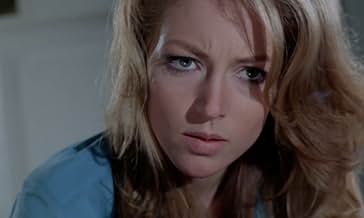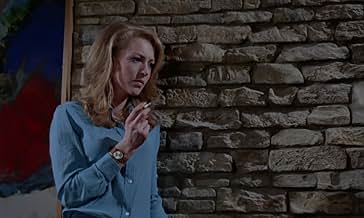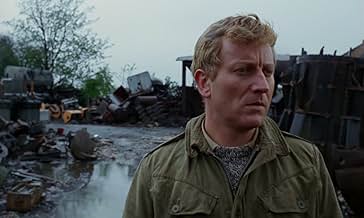Robbery
- 1967
- 1 घं 50 मि
IMDb रेटिंग
6.9/10
2.2 हज़ार
आपकी रेटिंग
अपनी भाषा में प्लॉट जोड़ेंA group of British criminals plan the robbery of the Royal Mail train on the Glasgow-London route.A group of British criminals plan the robbery of the Royal Mail train on the Glasgow-London route.A group of British criminals plan the robbery of the Royal Mail train on the Glasgow-London route.
- पुरस्कार
- कुल 1 जीत
Patrick Jordan
- Freddy
- (as Patrick Jordon)
Kenneth Farrington
- Seventh Robber
- (as Ken Farrington)
Roger Booth
- Detective
- (बिना क्रेडिट के)
Ron Charles
- Seaman
- (बिना क्रेडिट के)
फ़ीचर्ड समीक्षाएं
8emm
What obviously is a great (or maybe not-so-great depending on who to trust) film elsewhere on the world map, ROBBERY (1967) has since been into obscurity in the States. The print's a knockout! This may have helped launch future rip-offs of the burglar heist category, including the mellow-yellow LOOPHOLE. Anyone here who finds this will be glad that this is just one of the few kinds of movies that has never been seen quite often these days. It's a truly interesting find! Starting off with a long car chase, it becomes deeply involving with the story where Clifton runs a professional crook squad planning and attempting to rob a trainload of loot. You will not expect a fast-paced breeze through a simple little concept like stealing, but a very sharp plot makes this stand out, where one event leads to another. With a near-surprise finish, this is one domestic rarity that must be seen, and is highly recommended. Take it from me, you will be surprised at how many good movies are left in waiting for the eye.
The terseness of the one-word title perfectly fits the low-keyed demeanour of this laconic heist movie that just a couple of years earlier would have been shot in black & white but now had to be in colour (but with results so pleasing to the eye I'm not complaining).
The initial car chase promptly brought Peter Yates to America to repeat the trick but seeing it staged in the narrow streets of London rather than in San Francisco in 'Bullitt' (which could have been built for the job) the results were thus ten times more harrowing; and the film that follows is far more coherent.
The initial car chase promptly brought Peter Yates to America to repeat the trick but seeing it staged in the narrow streets of London rather than in San Francisco in 'Bullitt' (which could have been built for the job) the results were thus ten times more harrowing; and the film that follows is far more coherent.
This movie is well made, with a typical trade mark approach by the crime picture craftsman Peter Yates was. There's no big bang, no unnecessary violence, just the pace that tells the story. This method Yates used successfully in his Hollywood years building up a plot without too much distraction from standard story fillers, which produced great films such as "Bullitt" and "The Friends of Eddie Coyle". In this one Yates gives the audience just enough to paint a picture of a big time robbery, with minimal character development but enough to serve the purpose.
A must see for the fans of this classic director, not great but rather good crime movie that they don't make any more.
A must see for the fans of this classic director, not great but rather good crime movie that they don't make any more.
A gang of crooks plan a big score and use other smaller robberies as a means of financing it. Clearly inspired by the Great Train Robbery of the 1960's, although the facts are shifted - maybe made for legal reasons?
This is the kind of film that I loved as child. And still do. Live-for-today criminals that stop at nothing to get their hands on the loot and heaven help anybody that gets in the way. While having the plus of the robbery and the usual gang of rent a villains it does minor variations on the expected while not leaving the well trodden track.
The car chase through central London is one of the best things here and inspired many impersonations. Indeed it is probably the first homicidal chase through a big city seen on screen.
(The chase in Bullet is a complete rip-off - although Peter Yates directed this as well!)
As another viewer noticed the dialogue is dated (no swearing!) and the thing lacks a clear hero and villain. All-in-all like watching one of the better episodes of The Sweeney (a UK TV series) and a good guide to London -- as it was back in the Swinging Sixties.
This is the kind of film that I loved as child. And still do. Live-for-today criminals that stop at nothing to get their hands on the loot and heaven help anybody that gets in the way. While having the plus of the robbery and the usual gang of rent a villains it does minor variations on the expected while not leaving the well trodden track.
The car chase through central London is one of the best things here and inspired many impersonations. Indeed it is probably the first homicidal chase through a big city seen on screen.
(The chase in Bullet is a complete rip-off - although Peter Yates directed this as well!)
As another viewer noticed the dialogue is dated (no swearing!) and the thing lacks a clear hero and villain. All-in-all like watching one of the better episodes of The Sweeney (a UK TV series) and a good guide to London -- as it was back in the Swinging Sixties.
An extended near-wordless sequence, punctuated by Johnny Keating's tension-building staccato music, follows a cleverly planned diamond heist. Followed by an exciting high-speed car chase through the streets of London, the opening scenes of Peter Yates "Robbery" illustrate cinematic story-telling at its best. Although following the diamond job, the film slows to a more sedate pace, nevertheless, director Yates keeps the focus on plot and detail with a minimum of filler. After the diamond robbery, Stanley Baker as Paul Clifton re-groups his men, and, with added members, they buy into another robbery, which he promises will be the big one and net three or four million pounds. The target is the Royal Mail Train on the eve of a three-day bank holiday. Clifton's planning is meticulous and includes springing Robinson, played by Frank Finlay, from prison with an all too easy diversion ploy. While Baker and his boys proceed, police inspector Langdon, played by James Booth, heads an investigation into the diamond heist, which hones in on Clifton and other members of Baker's group.
Cutting between the robbery plans, the inspector's work, and a brief peek at Clifton's domestic life, the film is an excellent thinly-veiled dramatization of the famous British great train robbery, which took place in 1963, four years before the film was made. The scenes of domestic crisis between Baker and Joanna Pettet as his wife are probably the film's weakest; Pettet has little to do, and her presence seems little more than a gratuitous female token. However, the screenplay by Edward Boyd, Peter Yates, and George Markstein is tight otherwise, and the shift between the plotters and the police adds suspense, although viewers may identify with the unarmed robbers and cheer them on. Peter Yates's direction is top notch, although he subsequently topped the opening car chase with a more famous one in "Bullit." Featuring good performances throughout from Baker, Booth, Finlay, and Barry Foster, "Robbery" is well directed, well shot by cinematographer Douglas Slocombe, and provides excellent entertainment.
Cutting between the robbery plans, the inspector's work, and a brief peek at Clifton's domestic life, the film is an excellent thinly-veiled dramatization of the famous British great train robbery, which took place in 1963, four years before the film was made. The scenes of domestic crisis between Baker and Joanna Pettet as his wife are probably the film's weakest; Pettet has little to do, and her presence seems little more than a gratuitous female token. However, the screenplay by Edward Boyd, Peter Yates, and George Markstein is tight otherwise, and the shift between the plotters and the police adds suspense, although viewers may identify with the unarmed robbers and cheer them on. Peter Yates's direction is top notch, although he subsequently topped the opening car chase with a more famous one in "Bullit." Featuring good performances throughout from Baker, Booth, Finlay, and Barry Foster, "Robbery" is well directed, well shot by cinematographer Douglas Slocombe, and provides excellent entertainment.
क्या आपको पता है
- ट्रिवियाIt was the realistic car chase through the streets of London in this picture, that led to director Peter Yates doing another car chase in San Francisco a year later. Steve McQueen personally wanted Yates for what turned out to be his highest grossing film बुलिट (1968).
- गूफ़When the traffic warden puts the gas canister in the car, a white cable can be seen draping from the inside of the door and this is seen to be connected to the device as he removes it from his bag. There is no sign of the cable in the following close-up shot from his point of view.
- भाव
Paul Clifton: We're talking about millions of pounds now. We're talking about road blocks, car searches, house raids, shakedowns. They'll know who pulled the job. Without the money, they can't prove anything.
- कनेक्शनFeatured in Film Review: Film Review (1967)
टॉप पसंद
रेटिंग देने के लिए साइन-इन करें और वैयक्तिकृत सुझावों के लिए वॉचलिस्ट करें
विवरण
- रिलीज़ की तारीख़
- कंट्री ऑफ़ ओरिजिन
- भाषा
- इस रूप में भी जाना जाता है
- Überfall
- फ़िल्माने की जगहें
- Leyton Stadium, Brisbane Road, Leyton, लंदन, इंग्लैंड, यूनाइटेड किंगडम(Paul Clifton plans the train robbery with Frank, Dave, Ben and Don during a football match)
- उत्पादन कंपनियां
- IMDbPro पर और कंपनी क्रेडिट देखें
इस पेज में योगदान दें
किसी बदलाव का सुझाव दें या अनुपलब्ध कॉन्टेंट जोड़ें





































